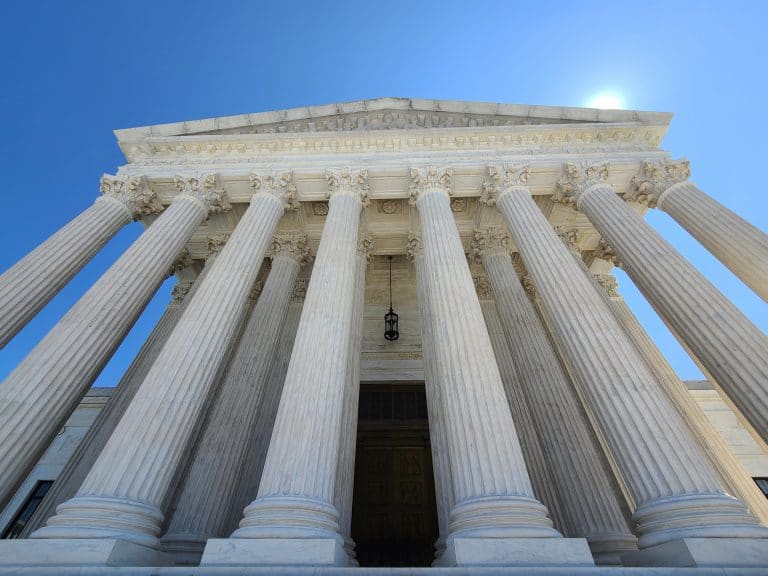On Friday, the Supreme Court agreed to hear a new Second Amendment case. Despite the justices’ ideological leanings, it’s unclear how they will rule for several reasons.
The Court will take up United States v. Rahimi in its October term. A Fifth Circuit panel ruled back in February that Zachary Rahimi’s conviction for possessing guns while under a domestic violence restraining order violated his Second Amendment rights. The Department of Justice appealed, and the Court accepted.
Usually, one sign of how the Court might rule is that they’re more likely than not to take up a case with a decision they wish to overturn. However, in this case, that’s less of an indicator because the Court is also more likely than not to take up a case where a federal law has been invalidated.
The legal and political implications of the case provide a better guide for how things might go. But those factors aren’t as easy to read when trying to determine an outcome.
This is a case with a very unsympathetic plaintiff that hasn’t been backed by any gun-rights groups. And the public is unlikely to be on Rahimi’s side either. At the same time, the Supreme Court’s Second Amendment test may be.
According to court documents, Rahimi was subject to a restraining order due to “family violence” against the mother of his child. He admitted to owning guns in violation of the order and federal law after police searched his home due to the multiple other crimes, including several shootings, he is accused of committing.
Between December 2020 and January 2021, Rahimi is accused of taking part in five different shootings. He is facing charges for shooting at somebody he had earlier sold drugs to, shooting at someone he cut off in traffic, and firing a gun in the air at a Whataburger after his friend’s credit card was declined. Any of those charges could also result in the Texas man losing his gun rights as well.
But they aren’t at issue in the Supreme Court case against him. That he’s a bad guy who has been accused of multiple shootings and domestic violence shouldn’t have an impact of the legal case against him. But it still might.
After all, there’s a reason gun-rights advocates haven’t prioritized fighting this particular restriction and have instead focused on “assault weapon” bans and gun-carry restrictions. Gun bans for domestic violence perpetrators are broadly popular; expanding them was even part of last year’s federal gun-control bill. And there’s good reason for that since perps often re-offend or even escalate their violence.
To this point, the Supreme Court has been unwilling to get ahead of the American public on gun policy. When the Court found the Second Amendment forstalled a total ban on handguns in 2008, handgun bans were deeply unpopular and nearly extinct. When it ruled the government can’t deny gun-carry permits to qualified applicants on a subjective basis, the carry revolution had already pushed 42 states to that point or even gotten them to eliminate permitting altogether.
The opposite can be said for domestic-violence-related gun restrictions.
2022’s New York State Rifle and Pistol Association v. Bruen was a six-to-three decision on the key question over whether the state’s carry law was constitutional and what the future test for gun cases should be. That indicates there’s a certain level of conformity on the Court about gun issues. But, if you a bit look closer, Bruen was more like a three-three-two decision.
That’s because Justice Brett Kavanaugh wrote a concurrence joined by Chief Justice John Roberts that emphasized a limit on Second Amendment protections the majority opinion didn’t, specifically asserting that non-subjective carry permitting is permissible without outlining the historical justification for why. That suggests they may be less than eager to wholesale remove popular gun policies. With the three justices on the left of the bench almost certain to vote against Rahimi, that makes five.
Still, the legal case may lean towards Rahimi. The Fifth Circuit panel’s examination of the historical record, which is what Bruen requires, found there was no tradition of banning those subject to domestic violence restraining orders from owning guns. Namely, it decided the gun regulations that existed at the founding didn’t address the same broad issue, protecting an individual from another individual, with the same punishment, total loss of gun rights.
“The Government fails to demonstrate that § 922(g)(8) ‘s restriction of the Second Amendment right fits within our Nation’s historical tradition of firearm regulation. The Government’s proffered analogues falter under one or both of the metrics the Supreme Court articulated in Bruen as the baseline for measuring ‘relevantly similar’ analogues: ‘how and why the regulations burden a law-abiding citizen’s right to armed self-defense,'” Judge Cory T. Wilson wrote for the panel in United States v. Rahimi. “As a result, § 922(g)(8) falls outside the class of firearm regulations countenanced by the Second Amendment.”
The panel considered laws that disarmed groups of people–usually racial minorities–who were perceived as dangerous, laws against “going armed to the terror of the people,” and “surety” laws that required individuals accused of being dangerous to post a bond before carrying a gun in public. They decided none of those were close enough matches to qualify as analogues.
“[O]n substance, the early ‘going armed’ laws that led to weapons forfeiture are not relevantly similar to § 922(g)(8),” Judge Wilson wrote. “First, those laws only disarmed an offender after criminal proceedings and conviction. By contrast, § 922(g)(8) disarms people who have merely been civilly adjudicated to be a threat to another person. Moreover, the ‘going armed’ laws, like the ‘dangerousness’ laws discussed above, appear to have been aimed at curbing terroristic or riotous behavior, i.e., disarming those who had been adjudicated to be a threat to society generally, rather than to identified individuals.”
Surety laws came the closest, but the panel was unconvinced.
“The surety laws required only a civil proceeding, not a criminal conviction,” the panel said. “The ‘credible threat’ finding required to trigger § 922(g)(8) ‘s prohibition on possession of weapons echoes the showing that was required to justify posting of surety to avoid forfeiture. But that is where the analogy breaks down: As the Government acknowledges, historical surety laws did not prohibit public carry, much less possession of weapons, so long as the offender posted surety.”
Perhaps a majority of the Supreme Court will feel differently on that point. Or maybe they’ll identify another set of historical laws the Fifth Circuit didn’t consider. Or, perhaps, they’ll come to the same conclusion that panel did.
When the Court agreed to hear Bruen, it was fairly clear the justices were going to strike down New York’s law. It was mainly the scope of the ruling that was uncertain. With Rahimi, uncertainty abounds.






